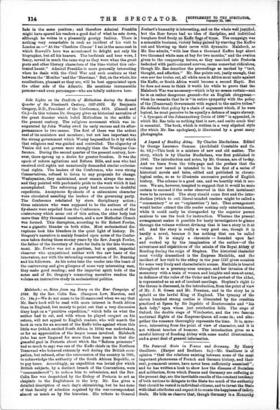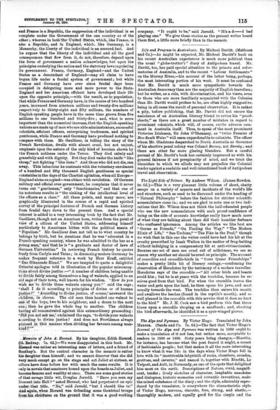The Paternal State in France and Germany. By Henry Gaullieur.
(Harper and Brothers. 6s.)—Mr. Gaullieur is of opinion " that the relations existing between some of the meat important phenomena of French and German history, and their real, permanent causes, have never been sufficiently examined" ; and he has written a book to show how the diseases of Socialism and militarism, from which France and Germany are suffering it the present day, are the inevitable malts of the constant tendency of both nations to delegate to the State too much of the authority that should be vested in individual citizens, and to invest the State with ideal attributes and expect it to create the happiness of indivi- duals. He bids us observe that, though Germany is a Monarchy and Prance is a Republic, the suppression of the individual is as complete under the Government of the one country as of the other ; whereas in both-the-United States, which, like France, is alao a Republic, and in England, which. like Germany, is a Monarchy, the liberty of the individual is an assured fact. And he argues that the liberty of the individual and all the good consequences that flow from it, do not, therefore, depend upon the form of government a nation acknowledges, but upon the principles underlying the nation and the statutory laws regulating its government. Prance, Germany, England—and the United States as a descendant of England—may all claim to have begun life under a feudal system of government; but while France and Germany have ever since feudal days been occupied in delegating more and more power to the State, England and her American offshoot have developed their life upon the opposite principle,—with the result, as to population, that while France and Germany have, in the course of two hundred years, increased from nineteen millions and twenty-five millions respectively to thirty-eight and fifty millions, the numbers of English-speaking people have in the same time grown from five millions to one hundred and thirty-five ; and, what is more important than the numerical increase, that the English-speaking nations are made up of men who are able administrators, successful colonists, efficient officers, enterprising tradesmen, and spirited gentlemen, while France and Germany have produced nothing to compare with them. Mr. Gaullieur, in telling the story of the French Revolution, dwells with almost cruel, but not unjust, emphasis upon the nature of the only kind of heroism shown by the French noblesse under the Terror. They died calmly and gracefully and with dignity. But they died under the knife "like sheep," not fighting "like lions." And those who did not die, ran away. This behaviour he contrasts with the voluntary enrolment of a hundred and fifty thousand English gentlemen as special constables in the days of the Chartist agitation, when all Europe— England alone excepted—was ablaze with revolution. Of German military and official over-government, he complains that it never tarns out "gentlemen," only "functionaries," and that one of its notorious results is "the sinking of the intellectual level of the officers as a class." All these points, and many more,' are graphically illustrated ie the course of a rapid and spirited survey of the principal features of French and German history from feudal days down to the present time. And a special interest is added to a very interesting book by the fact that Mr. Gaullieur, though not an American born, writes from the point of view of a citizen of the United States, addressing himself particularly to Americans bitten with the political mania of "Populism?' Mr. Gaullieur does not tell us to what country he belongs by birth, but he mentions that he was "educated in a French-speaking country, where he was admitted to the bar as a young man," and that he is "a graduate and doctor of laws of German Universities." In reviewing French history he quotes freely from Carlyle and Tame; in discussing modern Germany he makes frequent reference to a work by Herr Rraff, entitled " Das Glanzende mend." We are tempted to quote a delightful Oriental apologue told in illustration of the popular misconcep- tions about divine justice :—" A number of children being unable to divide fairly among themselves a bag of walnuts, applied to an old sage of their town, well known for his wisdom. 'How do you wish me to divide these walnuts among you ?' said the sage ; shall I do it according to principles of divine or of human justice?' ' According to divine justice, of course,' answered the children, in chorus. The old man then handed one walnut to one of the boys, two to his neighbour, and a dozen to the next one ; then he gave the whole bag to another. The children having all remonstrated against this extraordinary proceeding : 'Did you not ask me,' exclaimed the sage, 'to divide your walnuts according to divine justice ? And does not Providence always proceed in this manner when dividing her favours among man- kind P



















































 Previous page
Previous page